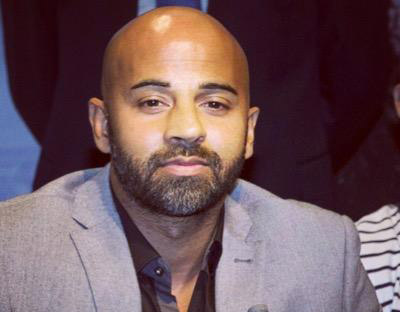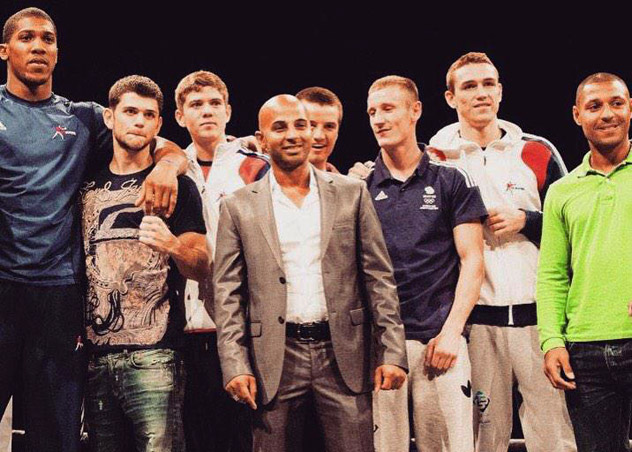Q&A: British trainer, manager and promoter Dave Coldwell


British trainer, manager and promoter Dave Coldwell (center) surrounded by a crowd of boxing talent.
The trials and tribulations in almost every area of the boxing business are many and varied, and one man who certainly has more than a cross to bear is trainer, manager, and promoter Dave Coldwell.
Born in India and raised in Sheffield, England, the former professional fighter has worked diligently to establish himself as a significant player in British boxing circles. Long days, longer nights and a struggle to reach the summit within a cloak-and-dagger industry would test the resolve of anyone, but Coldwell Boxing is here to stay.
Thus far a television deal for a throng of hungry prizefighters has eluded him and a web-based broadcasting facility, for Coldwell’s own events, has run its course financially. The father of two accepts such setbacks and marches onward because he learned, in the ring and out, to fight back when tested.
Coldwell is one of the most well-liked and admired personalities in U.K. boxing and earned his reputation by building relationships and being genuine. Brutally honest about his upbringing, modest about his successes, and steadfast about his future within the sport he loves, Coldwell is also as sharp a boxing man as one could ever encounter.
The current trainer of cruiserweight contender Tony Bellew spoke to RingTV.com about all things boxing in a candid and unique interview.
RingTV.com: Take me back to the beginning. How did your love affair with boxing begin?
Dave Coldwell: I was bullied very badly at school when I was a kid and it was beyond horrible. I turned to boxing because of that and because I was mesmerized by the likes of Sugar Ray Leonard and Mike Tyson. My mother wouldn’t let me box but I left home at 15 years old, went to a boxing gym and that decision changed my life. I eventually turned pro but my fighting career isn’t something that I’m particularly proud of. I was good in the gym but I lacked confidence on fight night because I’d always been told that I wouldn’t achieve anything. I didn’t really have any self-belief until I was 25 years old, but my experience as a pro led to success in other areas. I can relate to what fighters are thinking and how they’re feeling.
RTV: What influenced the fighter-to-trainer move?
DC: I started running Brendan Ingle’s second gym, at the Manor Estate, in Sheffield, training kids from scratch. I developed some really good amateurs and when they turned professional I applied for my trainer license. My first job in a corner was when Ritchie Wenton fought Scott Harrison and, in later years, I trained Kell Brook and Curtis Woodhouse to British titles. I also trained Ryan Rhodes when he won European, and later on when he challenged Canelo Alvarez for the WBC world title.
RTV: You’re now a promoter, a manager and a trainer. Are there enough hours in the day?
DC: (Laughs) Not really. The reason I stopped training fighters when Ryan (Rhodes) retired is because I didn’t have the time anymore. As a full-time trainer, I was in the gym six hours a day and that was eating into my duties as a promoter and a manager. I work on behalf of 32 fighters and have contacts up and down the country, as well as overseas. There is no way to juggle that and be in the gym full-time. When I decided to train Tony Bellew that was a one-off and I ended up falling in love with it again. I could perhaps take on one more fighter, maybe two, providing I’m not committed to six hour days.
RTV: The promoting and management side of the game can be frustrating. What obstacles have you encountered?
DC: When you don’t have television or a big budget it’s very hard to be a promoter in boxing. My business partner, Spencer Fearn, and I have a great team and produce quality shows because we’re dedicated to providing good fights for the fans. However, it becomes difficult when prospects reach title contention because it’s an expensive game without TV and you end up losing money. At that point other promoters who have television deals will pick up these fights, and I won’t stand in the way of that. If I can’t provide a television date then I have no right to stop a fighter from earning or gaining exposure on Sky Sports, Eurosport or BoxNation.
RTV: What’s the latest with Coldwell Television?
DC: It’s roughly ┬ú6,000 ($9,050) to transmit a professional internet broadcast and we can’t justify those costs right now. It worked well for the two years we had it running and the feedback was terrific. In reality, though, it was an investment to propel us towards television and unfortunately that hasn’t happened yet. We’re now focused on developing the fighters we have and getting them the best possible opportunities.
RTV: Al Haymon has signed a deal with NBC Sports in the U.S. and he obviously enters that with a squad of world level talent. What do you make of Haymon’s strategy?
DC: Any boxing on free-to-air television is fantastic. The only issue will be if Al Haymon can consistently deliver entertaining fights. This could take us back to the great days when network television dominated prizefighting. If Haymon takes risks then we’re entering a great era in boxing but if he doesn’t then it could fail badly.
RTV: Are you concerned about spreading yourself too thin? In the future can you see yourself focusing solely on one area or does multi-tasking suit you?
DC: I can handle the multi-tasking because I’m not training full-time anymore. My kids are a massive part of my life and I need to be there for them. I work my own hours with a view to creating quality time and that will never change. On Valentine’s Day there’s a “Prizefighter” show in Blackpool, so I’m taking my wife and kids with me. It’s not ideal (laughs) but sometimes I need to incorporate my family life into my professional life.
RTV: In terms of the fighters that you manage, who should we look out for and why?
DC: Robbie Davies Jr. is an extremely talented junior welterweight who has won eight straight fights. Maxi Hughes, who was unlucky to only get a draw against Martin Ward (in December), has a direct rematch with Ward in April. Jordan Cooke is only 2-0 but I would put him in the same bracket as Robbie Davies Jr.; he could do really big things in the sport if given the opportunity. Locally, we have Lee Appleyard who is a huge ticket-seller and a lovely kid. They’re all very talented but we have several fighters who fans should look out for. In terms of bigger names, I also manage Jamie McDonnell (rated No. 8 by THE RING at bantamweight) and he is a pleasure to work with. His fight with (WBO titleholder) Tomoki Kameda is already signed and we’re just waiting on a date for that. A lot of people think I sign up talent to promote but I manage the majority of fighters we have. That’s why I put them on bigger shows and I work well with other promoters.
RTV: Does Tony Bellew become world champion this year?
DC: Yes, he does, and that’s a massive goal of mine for 2015. I’ve known Tony since before he turned professional and he’s a good friend of mine. He is the hardest worker I’ve ever had and although some people criticize him for talking, nobody would know who he was if he didn’t make some noise. People complain when sportsmen have zero personality and still complain when someone does have something to say. Tony doesn’t get the credit he deserves and what I like about him is he’s never satisfied, he always wants to improve.
RTV: Amazingly, after such a frenetic first fight with Nathan Cleverly, the rematch failed to deliver. What do you attribute that to?
DC: Tony was there to fight and Nathan Cleverly wasn’t, and you need two people to make a great fight. If someone isn’t willing to engage you can’t just throw caution to the wind. The plan was to work the body and take away Nathan’s legs and we did that, but then he just went to the ropes and clammed up. It’s like when a top prospect fights a journeyman and the journeyman covers up to avoid being knocked out. It doesn’t mean the prospect can’t punch, it just means the journeyman has survival on his mind. Nathan was satisfied to go the distance.
RTV: And what else have you got planned for 2015?
DC: I want Tony Bellew to win a world title and I want to train another fighter who I can enjoy working with. I also want to sign up some more talent who I can manage and guide towards titles. I enjoy creating good careers for these kids and that keeps me motivated. I love the sport, although there are a lot of headaches when people become hard to deal with. Sometimes it’s difficult to get fighters to go on the road and that hurts the sport domestically. When I was fighting, if you weren’t a national champion or a huge ticket-seller you weren’t promoted as a fighter. Nowadays there are kids with two unlicensed matches coming to us and asking if we can offer them a deal.
RTV: Do you have an ultimate goal? What dragons are left to slay?
DC: Everything I do is with an aim to get into the big stuff. I’ll hang in there as a promoter until television opens up for me. If I’m given an opportunity then I think I can make a great deal because I put on quality fights without these big budgets. I also want to manage top prospects, top champions and elite performers.
You can visit Coldwell Boxing at www.coldwellboxing.com
Tom Gray is a member of the British Boxing Writers’ Association and has contributed to various publications. Follow him on Twitter: @Tom_Gray_Boxing















